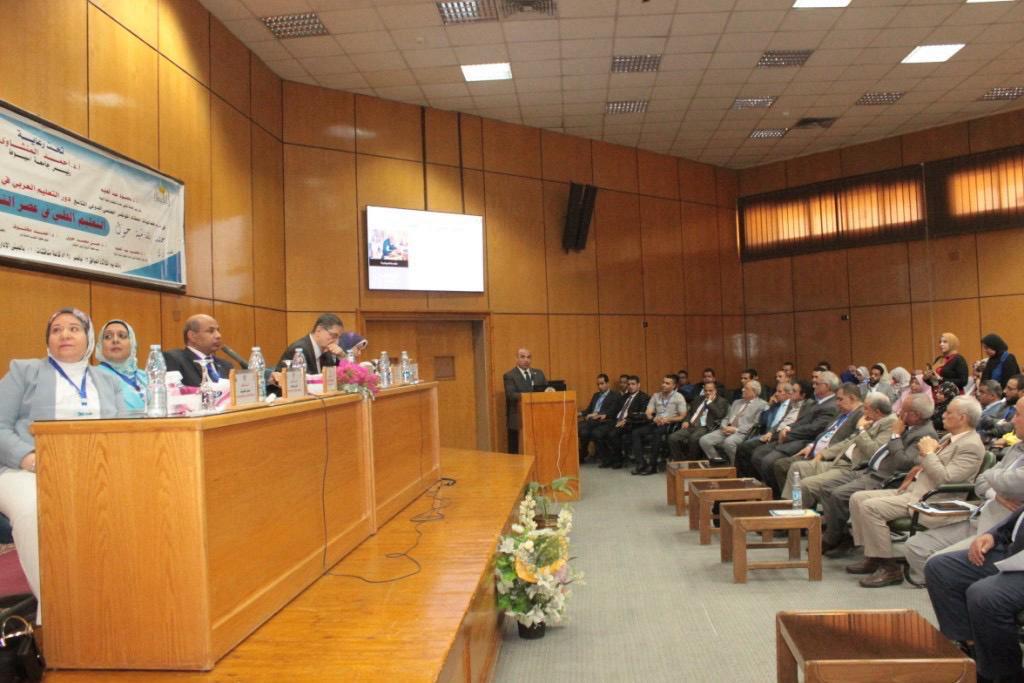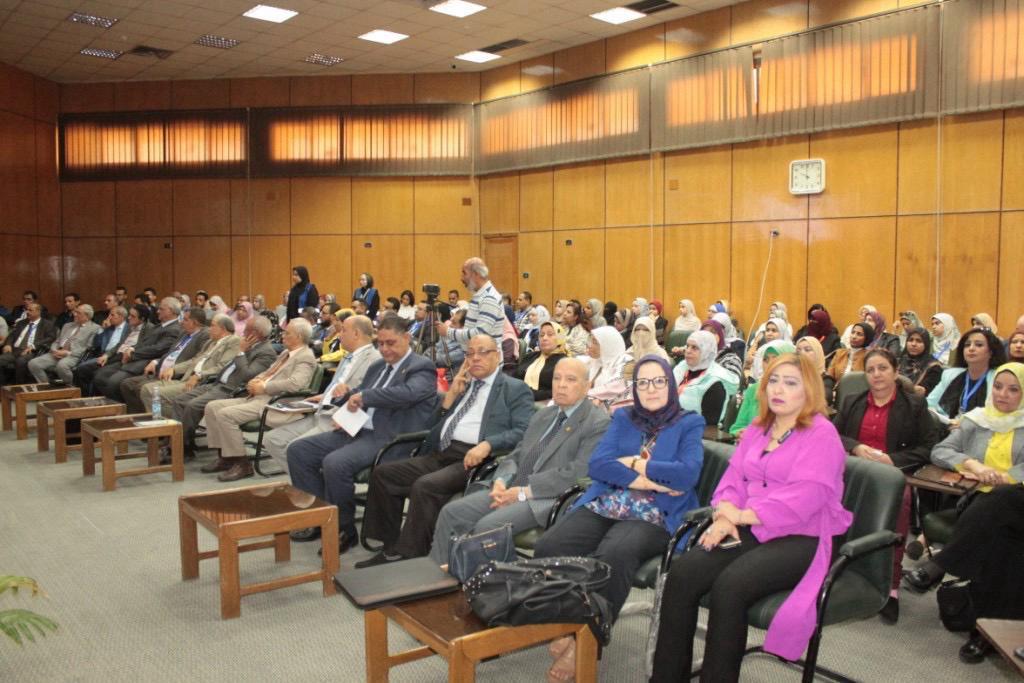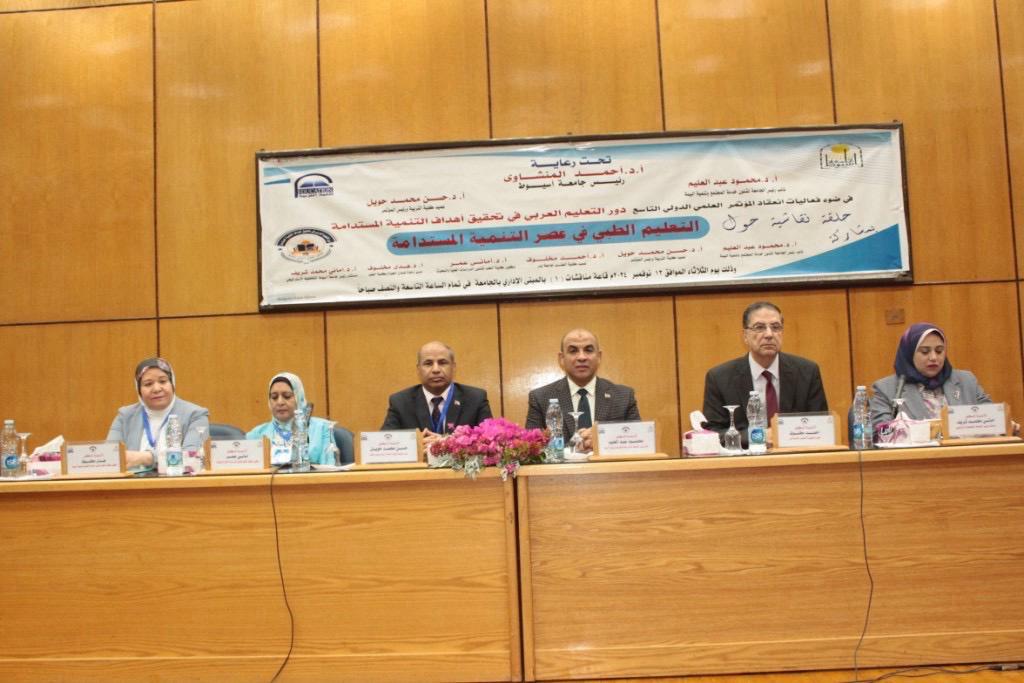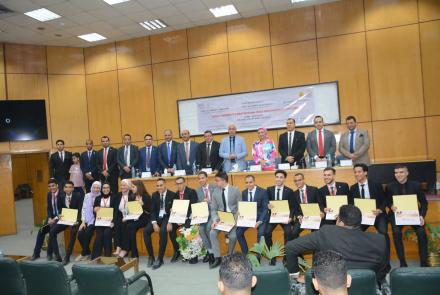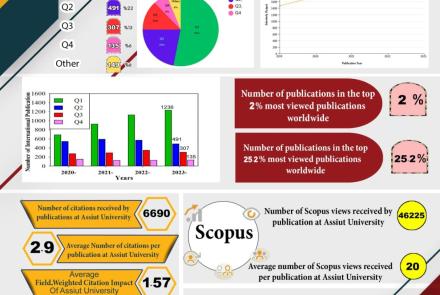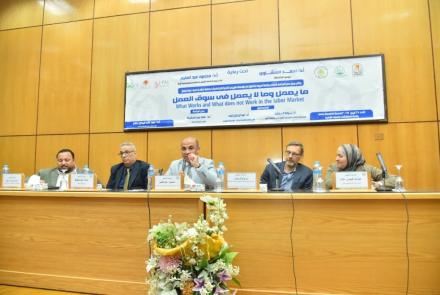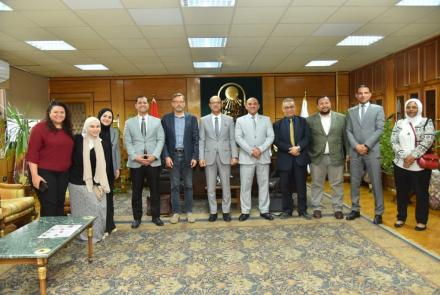Prof. El-Minshawy: the recommendations confirmed the development of research plans in Arab educational departments and institutions in the light of the Sustainable Development Goals
President of Assiut University: developing the skills of the Arab lecturers in the light of artificial intelligence skills and sustainable development goals
The ninth International Conference of the Faculty of Education at Assiut University concluded its activities under the title "The Role of Arab Education in Achieving Sustainable Development Goals", under the supervision of Prof. Ahmed El-Minshawy, president of Assiut University, and the supervision of Dr. Hassan Hewail, dean of the Faculty of education and chairman of the conference, and Dr. Mohammed Jaber Qasem, vice dean of the Faculty of Education for Education and Student Affairs and vice chairman of the conference.
Prof. Ahmed El-Minshawy stated that the conference activities have been concluded; and to come up with recommendations, applicable on the ground, the most important of which are: the adoption of Egyptian and Arab presidential initiatives in human building; to keep pace with global trends, and prepare an intersectional program; to train the associate Commission in medical specialties; to achieve sustainable development goals, and the use of artificial intelligence applications; to improve Arab education and achieve sustainable development goals, the introduction of grants of integration between different sciences in Arab education, the adoption of the green and environmentally friendly schools initiative; to achieve sustainable development goals, and the development of Arab educational curricula in the light of the Sustainable Development Goals, the adoption of green curricula in Arab schools and universities, and the establishment of centers and units of sustainable development in Arab schools and universities; to achieve the goals of sustainable development, the development of new educational programs in Arab universities to foresee the sciences of the future; to keep pace with the future needs of the Arab labor market.
The conference also recommended adopting an initiative to link educational research to meet the requirements of developing Arab education, developing psychological and educational research to achieve the goals of knowledge economics, reviewing the Arab curricula in the light of integrative, systemic, and sustainable thinking, developing research plans in Arab educational departments and institutions in the light of the Sustainable Development Goals, improving psychological services and extension services in Arab education, finding sources of funding for green Arab educational research, developing the merits of the Arab teacher in the light of artificial intelligence skills and sustainable development goals.
The conference organized a panel discussion on "medical education in the era of sustainable development", within the conference activities, in the presence of Dr. Mahmoud Abdul Alim, vice president of the University for Community Service and Environmental Development Affairs, Dr. Hassan Hawil, dean of the faculty of Education, Dr. Ahmed Makhlouf, dean of the faculty of Medicine, Badr University, Dr. Amani Omar, vice dean of the faculty of medicine for graduate studies and Research Affairs, Dr. Amani Mohammed Sharif, advisor to the president of the University for Strategic Planning, Dr. Hoda Makhlouf, vice dean of the faculty of medicine for community service and environmental development, and Dr. Mohammed Jaber Qasem, vice dean of the faculty of education for educational affairs the students, in the presence of a constellation of agents and faculty members, from various faculties of the university, and a group of Assiut University students.
Dr. Mahmoud Abdel Alim explained the definition of medical education: it is a set of knowledge, skills, and behaviors; that aims to graduate a doctor; qualified to provide medical service, reviewing the axes of medical education in the era of Sustainable Development, which include: environmental, social and economic sustainability, adding that medical education is not a tool to improve health care, but an essential element to promote sustainable development; for its contribution to improving public health, and enhancing the social and economic welfare of communities, as he pointed out; how to graduate medical cadres capable of providing high-quality health care, taking into consideration the requirements of sustainable development, and the role of health care in sustainable development.
As prof. Ahmed Makhlouf explained," The evolution of teaching and Learning from Traditional to artificial intelligence", reviewing the mechanisms of the development of medical education from traditional to modern methods, the benefits of using artificial intelligence in medical education, the challenges and concerns associated with artificial intelligence in medical education, strategies to balance between traditional and artificial intelligence, the impact of using artificial intelligence on the future of medical education, ethical considerations in medical education, explaining; scientific examples of artificial intelligence applications in medical education.
Dr. Amani Omar congratulated the Faculty of education, the efforts of all those in charge of work, and their outstanding contribution in organizing this conference, wishing all participants to come up with fruitful information, explaining the importance of the meeting in preparing the future doctor according to international academic standards, and providing him with clinical, ethical and research skills, in addition to attention to the psychological aspect, to achieve sustainable development of Egypt's Vision 2030, and meet the requirements of the labor market, to provide the best medical service to patients.
Following Dr. Hassan Hewail, he pointed out that the Faculty of education includes intersectional programs, between the Faculty of education, the Faculty of Arts, and the Faculty of science, explaining the importance of intersectional disciplines, as it is the direction of universities in the coming period, appreciating the role of the conference in the seminars it includes in addressing various trends in education, including medical education, through (9) Scientific Sessions, including research.
Dr. Amani Sharif explained the benefits of education for Sustainable Development, which lie in several main axes, including: empowering individuals; as education gives individuals the necessary knowledge and skills; to achieve personal and professional development, and enables them to acquire knowledge, pointing out that education plays a role in promoting economic development and environmental protection, as education through the inclusion of Sustainable Development Goals in the school curricula; to give students a pivotal role to achieve the Sustainable Development Goals.
Dr. Hoda Makhlouf thanked the Faculty of Education and its keenness for the second year in a row to cooperate with the Faculty of Medicine, explaining the importance of coordination with colleges and all specialties through holding awareness workshops and seminars, courses for Human Development, for doctors, to develop communication skills of the doctor, awareness of artificial intelligence, and its importance in the field of health, as well as the work of inter-specialties between the Faculty of Medicine and other faculties.
